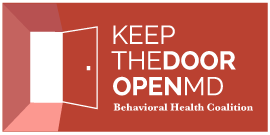Download full press release here.
(Annapolis, Md.) –As the 2019 Maryland General Assembly session draws to a close, the Maryland Behavioral Health Coalition cheered the passage of several key legislative priorities to ensure that every Marylander has access to mental health and substance use disorder treatment when and where needed.
One of the Coalition’s key goals was to ensure adequate “Keep the Door Open” funding in the Fiscal Year 2020 budget for behavioral health services. Passed in 2017 as part of the HOPE Act, the Keep the Door Open Act provided a long overdue boost in funding for community behavioral health services. In 2018, the legislature enacted multi-year funding initiatives to expand crisis response services and improve the delivery of behavioral health care in primary care settings.
“We thank the General Assembly and Governor Hogan for upholding Maryland’s promise to our citizens with mental health and substance use disorders,” said Dan Martin, senior director of public policy for the Mental Health Association of Maryland. “Demand for these services continues to rise, and we are pleased to see the state step up to make sure that our programs and treatment services are fully funded and working to help people in need.”
Legislators also approved a commensurate increase in behavioral health provider reimbursement rates in its passage of a bill to gradually raise Maryland’s minimum wage to $15 per hour. (The legislature overrode Governor Hogan’s veto of the bill.) Advocates say that this boost in rates was crucial to ensure services were not reduced or eliminated.
“Reimbursement for community behavioral health providers is set by the state and is not adjusted to account for rising costs, meaning that any increase in the minimum wage would need a corresponding boost in reimbursement rates,” said Shannon Hall, executive director of the Community Behavioral Health Association of Maryland. “We thank the General Assembly for listening to the behavioral health community and for enabling us to keep providing effective treatment for our friends and family members living with mental health and substance use disorders. We are thrilled to see thousands of Marylanders, including community behavioral health treatment providers, get a raise.”
Advocates also cheered passage of HB 116/SB 846 which will expand access to medication-assisted treatment (MAT) in local correctional facilities across the state. The legislation is modeled after a Rhode Island program associated with a 61 percent decrease in post-incarceration overdose deaths and a corresponding 12 percent reduction in overdose deaths statewide.
“The opioid epidemic is continuing to claim lives every day. We are happy to see the state expand access to this life-saving treatment where it is needed most,” said Nancy Rosen-Cohen, executive director of the National Council on Alcoholism and Drug Dependence, Maryland Chapter. “We must continue working to ensure that every Marylander with a behavioral health disorder can access the treatment they need.”
The Coalition also supported the Blueprint for Maryland’s Future, a bill to enhance public education in the state, which served as a vehicle to implement some recommendations from the Kirwan Commission on Innovation and Excellence in Education. The bill includes funding over the next two years for a variety of Commission priorities, including several behavioral health-related reforms. Advocates say these steps will improve both student health and educational outcomes.
###
Media Contacts:
Shannon Hall, Community Behavioral Health Association of Maryland, 202-302-8397
Dan Martin, Mental Health Association of Maryland, 410-978-8865
Nancy Rosen-Cohen, National Council on Alcoholism and Drug Dependence, Maryland, 703-606-2897
